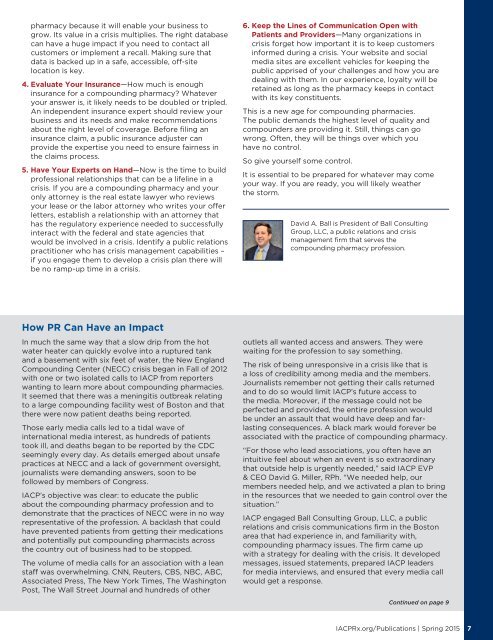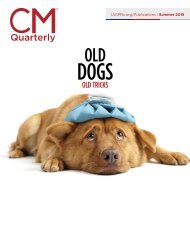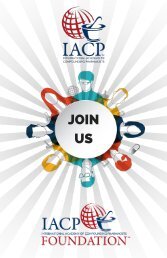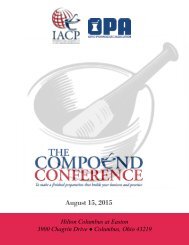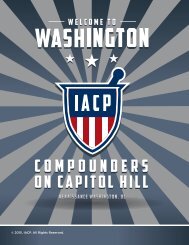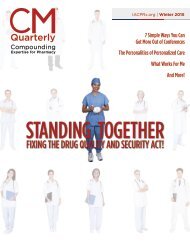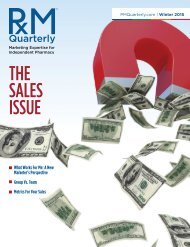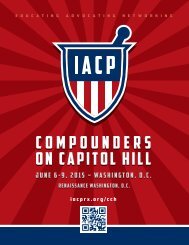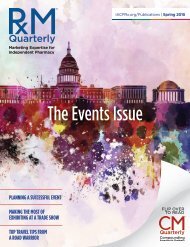Compounding Matters Quarterly - Spring 2015
Welcome to the spring issue of Compounding Matters Quarterly. In this issue: A Note From the President Six Things I Have Learned From Compounding Pharmacy Crises The Memorandum of Understanding: What It Is, What It Says, And What Happens Next The MOU -A Pharmacist's Perspective Personality of Personalized Care: Loren Madden Kirk IACP Foundation History Part 1 Save the Date For These Upcoming Programs
Welcome to the spring issue of Compounding Matters Quarterly.
In this issue:
A Note From the President
Six Things I Have Learned From Compounding Pharmacy Crises
The Memorandum of Understanding: What It Is, What It Says, And What Happens Next
The MOU -A Pharmacist's Perspective
Personality of Personalized Care: Loren Madden Kirk
IACP Foundation History Part 1
Save the Date For These Upcoming Programs
Create successful ePaper yourself
Turn your PDF publications into a flip-book with our unique Google optimized e-Paper software.
pharmacy because it will enable your business to<br />
grow. Its value in a crisis multiplies. The right database<br />
can have a huge impact if you need to contact all<br />
customers or implement a recall. Making sure that<br />
data is backed up in a safe, accessible, off-site<br />
location is key.<br />
4. Evaluate Your Insurance—How much is enough<br />
insurance for a compounding pharmacy? Whatever<br />
your answer is, it likely needs to be doubled or tripled.<br />
An independent insurance expert should review your<br />
business and its needs and make recommendations<br />
about the right level of coverage. Before filing an<br />
insurance claim, a public insurance adjuster can<br />
provide the expertise you need to ensure fairness in<br />
the claims process.<br />
5. Have Your Experts on Hand—Now is the time to build<br />
professional relationships that can be a lifeline in a<br />
crisis. If you are a compounding pharmacy and your<br />
only attorney is the real estate lawyer who reviews<br />
your lease or the labor attorney who writes your offer<br />
letters, establish a relationship with an attorney that<br />
has the regulatory experience needed to successfully<br />
interact with the federal and state agencies that<br />
would be involved in a crisis. Identify a public relations<br />
practitioner who has crisis management capabilities –<br />
if you engage them to develop a crisis plan there will<br />
be no ramp-up time in a crisis.<br />
6. Keep the Lines of Communication Open with<br />
Patients and Providers—Many organizations in<br />
crisis forget how important it is to keep customers<br />
informed during a crisis. Your website and social<br />
media sites are excellent vehicles for keeping the<br />
public apprised of your challenges and how you are<br />
dealing with them. In our experience, loyalty will be<br />
retained as long as the pharmacy keeps in contact<br />
with its key constituents.<br />
This is a new age for compounding pharmacies.<br />
The public demands the highest level of quality and<br />
compounders are providing it. Still, things can go<br />
wrong. Often, they will be things over which you<br />
have no control.<br />
So give yourself some control.<br />
It is essential to be prepared for whatever may come<br />
your way. If you are ready, you will likely weather<br />
the storm.<br />
David A. Ball is President of Ball Consulting<br />
Group, LLC, a public relations and crisis<br />
management firm that serves the<br />
compounding pharmacy profession.<br />
How PR Can Have an Impact<br />
In much the same way that a slow drip from the hot<br />
water heater can quickly evolve into a ruptured tank<br />
and a basement with six feet of water, the New England<br />
<strong>Compounding</strong> Center (NECC) crisis began in Fall of 2012<br />
with one or two isolated calls to IACP from reporters<br />
wanting to learn more about compounding pharmacies.<br />
It seemed that there was a meningitis outbreak relating<br />
to a large compounding facility west of Boston and that<br />
there were now patient deaths being reported.<br />
Those early media calls led to a tidal wave of<br />
international media interest, as hundreds of patients<br />
took ill, and deaths began to be reported by the CDC<br />
seemingly every day. As details emerged about unsafe<br />
practices at NECC and a lack of government oversight,<br />
journalists were demanding answers, soon to be<br />
followed by members of Congress.<br />
IACP’s objective was clear: to educate the public<br />
about the compounding pharmacy profession and to<br />
demonstrate that the practices of NECC were in no way<br />
representative of the profession. A backlash that could<br />
have prevented patients from getting their medications<br />
and potentially put compounding pharmacists across<br />
the country out of business had to be stopped.<br />
The volume of media calls for an association with a lean<br />
staff was overwhelming. CNN, Reuters, CBS, NBC, ABC,<br />
Associated Press, The New York Times, The Washington<br />
Post, The Wall Street Journal and hundreds of other<br />
outlets all wanted access and answers. They were<br />
waiting for the profession to say something.<br />
The risk of being unresponsive in a crisis like that is<br />
a loss of credibility among media and the members.<br />
Journalists remember not getting their calls returned<br />
and to do so would limit IACP’s future access to<br />
the media. Moreover, if the message could not be<br />
perfected and provided, the entire profession would<br />
be under an assault that would have deep and farlasting<br />
consequences. A black mark would forever be<br />
associated with the practice of compounding pharmacy.<br />
“For those who lead associations, you often have an<br />
intuitive feel about when an event is so extraordinary<br />
that outside help is urgently needed,” said IACP EVP<br />
& CEO David G. Miller, RPh. “We needed help, our<br />
members needed help, and we activated a plan to bring<br />
in the resources that we needed to gain control over the<br />
situation.”<br />
IACP engaged Ball Consulting Group, LLC, a public<br />
relations and crisis communications firm in the Boston<br />
area that had experience in, and familiarity with,<br />
compounding pharmacy issues. The firm came up<br />
with a strategy for dealing with the crisis. It developed<br />
messages, issued statements, prepared IACP leaders<br />
for media interviews, and ensured that every media call<br />
would get a response.<br />
Continued on page 9<br />
IACPRx.org/Publications | <strong>Spring</strong> <strong>2015</strong><br />
7


